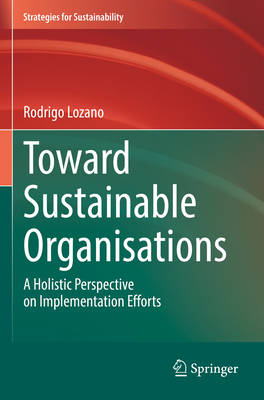
- Afhalen na 1 uur in een winkel met voorraad
- Gratis thuislevering in België vanaf € 30
- Ruim aanbod met 7 miljoen producten
- Afhalen na 1 uur in een winkel met voorraad
- Gratis thuislevering in België vanaf € 30
- Ruim aanbod met 7 miljoen producten
Zoeken
€ 213,95
+ 427 punten
Uitvoering
Omschrijving
The book is one of the first ones focussing on how organisations (civil society, corporations, and public sector ones) are contributing to sustainability. The book starts by providing a discussion of the four dimensions of sustainability (economic, environmental, social, and time). The second chapter focusses on what organisations are, their system elements (e.g. operations and production, management and strategy, and governance), stakeholders, relationships within and between organisations (ranging from competition to collaboration), and a framework for organisations to understand and map how they can contribute to sustainability. The third chapter discusses the twenty-four main tools, initiatives, and approaches (TIAs) that have been developed for organisations to contribute to sustainability, such as Circular Economy, Corporate Social Responsibility, Environmental Management Systems, and Sustainability Reporting. The fourth chapter focusses on organisational change management for sustainability, including types of change, drivers for change, resistance to change, incorporation, and institutionalisation. The fifth chapter presents empirical evidence on what civil society organisations have contributed to sustainability, from priorities and impacts, TIAs, external stimuli, and internal factors, drivers for change, starts of change, and development of change. The sixth chapter presents empirical evidence on what corporations have contributed to sustainability, from priorities and impacts, TIAs, external stimuli, and internal factors, drivers for change, starts of change, and development of change. The seventh chapter presents empirical evidence on what public sector organisations have contributed to sustainability, from priorities and impacts, TIAs, external stimuli, and internal factors, drivers for change, starts of change, and development of change. The last chapter provides the conclusions of the book.
The book is aimed at providing a multi-level, dynamic, and holistic perspective on the contributions of organisations to sustainability. The book's uniqueness lies in analysing organisations' efforts to become more sustainability oriented and contribute to making societies more sustainable through systems thinking, TIAs, and change processes.
The book is aimed at providing a multi-level, dynamic, and holistic perspective on the contributions of organisations to sustainability. The book's uniqueness lies in analysing organisations' efforts to become more sustainability oriented and contribute to making societies more sustainable through systems thinking, TIAs, and change processes.
Specificaties
Betrokkenen
- Auteur(s):
- Uitgeverij:
Inhoud
- Aantal bladzijden:
- 144
- Taal:
- Engels
- Reeks:
Eigenschappen
- Productcode (EAN):
- 9783030996789
- Verschijningsdatum:
- 20/05/2023
- Uitvoering:
- Paperback
- Formaat:
- Trade paperback (VS)
- Afmetingen:
- 156 mm x 234 mm
- Gewicht:
- 235 g

Alleen bij Standaard Boekhandel
+ 427 punten op je klantenkaart van Standaard Boekhandel
Beoordelingen
We publiceren alleen reviews die voldoen aan de voorwaarden voor reviews. Bekijk onze voorwaarden voor reviews.








